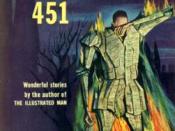Thompson 2
Thompson 1
Amber Thompson
Professor Nokes
English 1101
8 September 2014
All in the State of Mind
Setting can be defined as a specific or general time or place; however, in Fahrenheit 451 it's more broadly established as a state of mind instead. A world of war, violence, and death is all the characters of Fahrenheit 451 know about their own setting. Some members of society choose to establish their own setting, some adapt to the setting at hand, but death and depression are settings that every character faces. Through the events shown in Ray Bradbury's Fahrenheit 451 the setting is concluded to be depressing due to the past, day-to-day life, and a careless society.
The past is something hidden to Fahrenheit 451's society, leaving characters to establish a mental setting of the world around them. Character Captain Beatty explains to Guy Montag, very cautiously and in an undetailed manner, why the world they live in chooses to burn books.
Beatty explains to Montag that books were filled with ideas and logic that resembled many other books, and soon it was hard for people to distinguish the differences in novels. Captain Beatty concluded that this led to minorities deciding to burn books. Character Clarisse McCellan expresses her beliefs to Guy Montag, that she heard that firefighters once prevented and extinguished fires. Montag replied stating that all houses are fireproofed, (which readers later learn in part three that houses are not). All three characters base their explanations and reasons on their imagination. Nothing in Fahrenheit 451 is factually proven when debating the causes and effects of the past.
In the present day of Fahrenheit 451, characters are more concerned with the commands they are told instead of personal needs, wants, and understanding. Billboards have to be...


